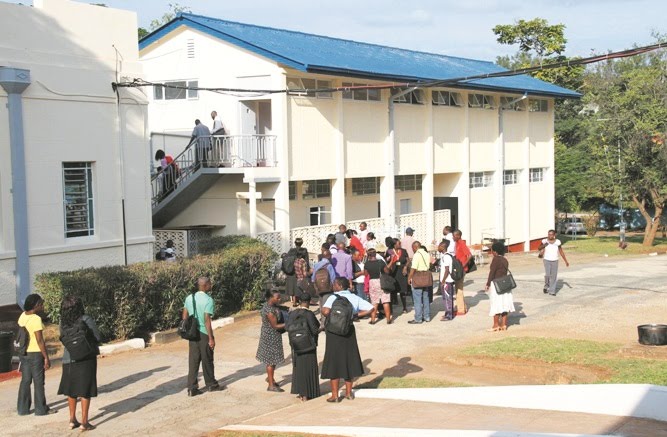By Dakarai Mashava
Professor Julie Elliott Stewart ,71, who heads the Southern and Eastern African Centre for Women’s Law at the University of Zimbabwe, says women now constitute 70 percent of students at all the country’s four law schools.

The country’s law schools include University of Zimbabwe Faculty of Law, the Midlands State University Law School, Great Zimbabwe University School of Law and the Zimbabwe Ezekiel Guti University Faculty of Law.
“One of the things now is that the law schools in the country, of which they are now four, all have more female students than males.
“The actual number (of girls studying law) at the moment I am not sure but it is somewhere between 65 and 70 percent….
“We started off with sort of parity in the early 2000s but it has slowly crept up in favour of women,” said Stewart.
The 2017 Walter Kamba Rule of Law Award winner was quick to point out that the domination of the country’s law schools by women has not resulted from affirmative action.
“It has been achieved purely on their academic results…no concessions. We have never had to give any concessions …this (affirmative action) which might have to operate in some of the science areas because that is where girls were being discouraged from taking those particular subjects,” said the respected law professor.
The award-winning lawyer added that the numbers are skewed in favour of women in the country’s law schools because girls are outshining boys in Advanced level examinations.
“When you look at the ‘‘A’’ Level results as they come in for scrutiny … you just see female, female and female and we are talking about fifteen pointers; it’s not 14 pointers or 13 pointers, just straight 15 pointers.
“You often hear stories like, ‘oh women are in these courses because of affirmative action’ no, certainly not in the law faculties and it will ultimately change the face of the legal profession… slowly but surely.
“It has been purely on merit,” said Stewart.
The law guru is convinced that women students’ domination of law school reflects the strides women are making across diverse sectors.
“I think to some extent it (domination of women) is becoming much more generalised across universities.
“In fact, I was reading something recently which indicated that this year’s Oxford University intake has more females than males for the first time in the university’s 1000 years. Women are on the rise,” she said.
Stewart, though, is keen to see women wielding more power on their lives beyond the law schools.
“For a very long time men dominated the arena and therefore women rights were not necessarily seen as being that significant.
“Yes we have had notions about the equality between women and men for a good 70 or 80 years at least but to actually see it moving into a reality framework is what we are seeing now.
“The Convention on the Elimination of All Forms of Discrimination against Women (Cedaw) came into operation in 1979.
“Zimbabwe signed up to it in the 1990s and we have also ratified it but the point is that just having it on paper doesn’t mean that women are able to actually exercise their rights.
“Zimbabwe is also a signatory to and has ratified the Protocol to the African Charter on Human and Peoples’ Rights on the Rights of Women in Africa but still it is still something on paper.
“Now the 2013 constitution … emphasises women’s rights over and over again but the problem still remains –how far has its provisions impacted the country at large?” she asked.
Though the country has enacted impressive laws safeguarding women rights, she conceded that most women are still unable to exercise their rights fully.
“Last week I was in a communal area fairly near to Harare — there, women who have access to television and radio…when we were discussing this, the women said yes we know all about our rights but how do we take them? We can’t access our rights in our families it is extremely difficult to do so.
“When we interviewed the local headman (I won’t give you any names) it was really quite depressing.
“Although he was sympathetic in a way towards women’s needs, he just said it’s not our tradition; it’s not our culture and no, women won’t get those rights here,” she told the Daily News.
Stewart believes women will only be able to realise their rights fully with the help of men.
“So, how do we change the situation for the average woman?
“I think urban women, particularly middle class women ….can to a large extent assert their rights but you still see them struggling, you still find them unaware of what their rights and entitlements are?
“So that is what we have to forward on …to try to ensure that women know their rights and are able to exercise their rights but perhaps even more importantly we have to start working on the men.
“We have to convince men that it is in their interests to ensure that women are able to fully exercise their rights and that you don’t lose your power if you recognise your daughter’s rights, your sister’s rights, your wife’s rights.
“There is a rough figure that is often bandied around that if women were fully able to exercise their rights to work, to be fully production on land it would add some 11 trillion dollars to the world economy so this male protectiveness of their supposed space is perhaps counterproductive.
“It’s only men, sometimes it is older women who you have to convince… because there is still a constant son preference,” said Stewart. DailyNews






